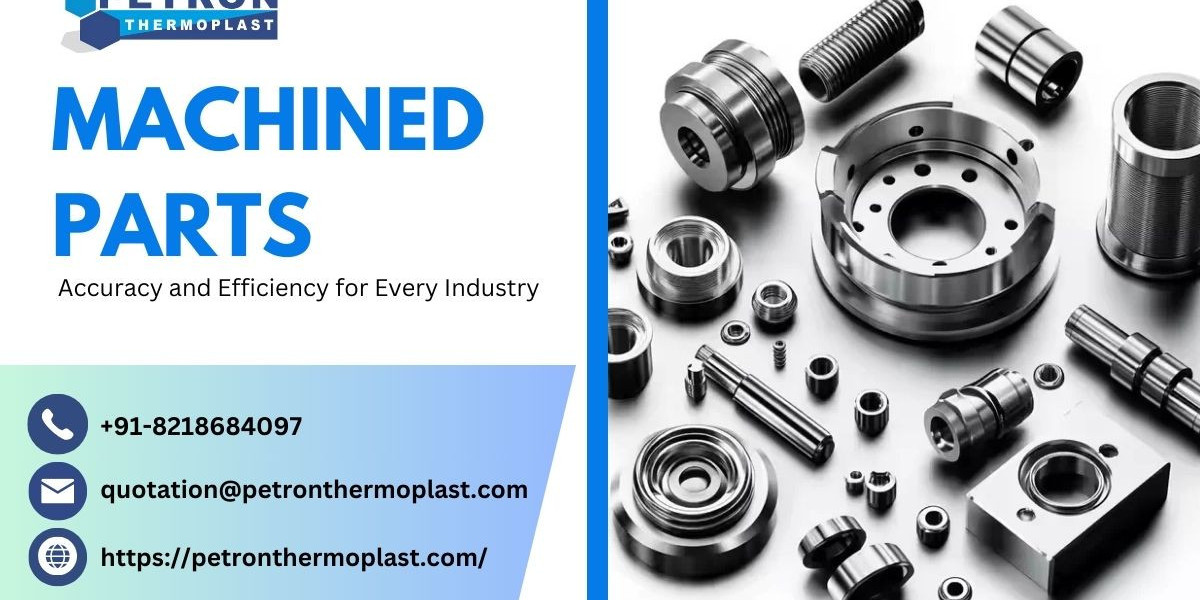Machined parts play a crucial role in modern manufacturing, enabling industries to achieve precision, efficiency, and high performance. These components are essential in applications where tight tolerances, durability, and accuracy are required. Whether in aerospace, automotive, medical, or industrial machinery, machined parts contribute to the seamless operation of complex systems. In this blog, we explore the importance of machined parts, their manufacturing processes, and how they enhance efficiency across various industries.
What Are Machined Parts?
Machined parts are custom-engineered components manufactured using CNC (Computer Numerical Control) machining, milling, turning, drilling, and grinding processes. These parts can be made from metals, plastics, and composites, depending on the application requirements.
Types of Machined Parts
- CNC Machined Parts – Components created using automated machining tools for high precision and repeatability.
- Milled Parts – Parts produced using rotary cutters to remove material and achieve complex shapes.
- Turned Parts – Cylindrical components manufactured through lathes for high-precision rotational symmetry.
- Drilled and Tapped Components – Parts with holes, threads, or recesses for fastening and assembly.
- Custom Machined Parts – Specially designed components for unique industrial applications.
Accuracy in Machined Parts
1. Importance of High Precision
Precision is one of the key attributes of machined parts, ensuring that components fit together perfectly and function efficiently. Industries like aerospace, medical, and semiconductor manufacturing require tolerances as tight as ±0.001mm, which can only be achieved through advanced machining techniques.
2. How Accuracy is Achieved
- CNC Machining: Computer-controlled machines ensure consistent, precise cutting and shaping.
- High-Quality Materials: Selecting the right materials enhances dimensional stability and durability.
- Advanced Measuring Equipment: Tools like CMM (Coordinate Measuring Machines) and laser scanners verify accuracy.
- Skilled Machinists: Expertise in programming, setup, and finishing ensures superior precision.
3. Benefits of Precision Machined Parts
- Improved product performance – Ensures seamless operation in mechanical systems.
- Reduced waste and material costs – Minimizes errors and production defects.
- Faster assembly and integration – Precision components fit perfectly without modifications.
Efficiency in Machined Parts Manufacturing
1. Advanced Machining Techniques for Maximum Efficiency
Efficiency in machining reduces production time and operational costs. The following technologies play a critical role:
- CNC Machining – Delivers repeatability and automation, reducing manual labor.
- 5-Axis Machining – Allows complex part production in a single setup, enhancing speed.
- Automated Tool Changes – Improves efficiency by minimizing downtime during production.
- High-Speed Machining – Enables faster cutting and shaping without compromising accuracy.
2. Cost Efficiency and Mass Production
Machined parts manufacturing improves cost efficiency through:
- Bulk production capabilities – Reducing unit cost per part.
- Material optimization – Minimizing waste with precise cutting.
- Reduced assembly time – Perfectly machined components require less post-processing.
3. Sustainability and Energy Efficiency
Modern machining techniques help reduce energy consumption and waste by:
- Using eco-friendly coolants.
- Implementing recyclable materials.
- Employing AI-driven optimization techniques for minimal scrap generation.
Industries That Rely on Machined Parts
1. Aerospace & Defense
- Jet engine components, landing gear parts, and structural elements require high-precision machining to withstand extreme conditions.
- Aerospace manufacturers use lightweight metals like titanium and aluminum for optimized fuel efficiency.
2. Automotive Industry
- Machined parts are used in engine blocks, transmission components, and braking systems.
- High-precision parts improve vehicle safety, fuel efficiency, and performance.
3. Medical & Healthcare
- Surgical instruments, prosthetics, and dental implants require biocompatible and high-precision components.
- CNC machining ensures smooth finishes and intricate detailing necessary for medical applications.
4. Electronics & Semiconductor
- Heat sinks, circuit board components, and connectors need micro-machining for intricate details.
- Advanced materials like PEEK and PTFE are used for insulation and heat resistance.
5. Oil & Gas Industry
- Machined parts are crucial for valves, seals, and drilling components.
- High-strength metals like stainless steel and Inconel ensure resistance to extreme pressure and corrosion.
6. Industrial Machinery & Equipment
- Precision machining is used in gears, bearings, shafts, and hydraulic components.
- Ensures smooth operation in manufacturing plants and heavy machinery.
Choosing the Right Machined Parts Manufacturer
1. Experience & Expertise
A reputable manufacturer should have a proven track record in high-precision machining with expertise in various industries.
2. Material Selection
Top manufacturers provide a wide range of metals, plastics, and composites to meet industry-specific requirements.
3. Compliance with Industry Standards
Ensure the manufacturer adheres to ISO 9001, AS9100, and FDA certifications for quality assurance.
4. Customization Capabilities
A good supplier offers custom-designed machined parts tailored to your specifications.
5. Advanced Technology & Equipment
Leading manufacturers use CNC machining, laser cutting, and automated inspection systems for precision and efficiency.
Future Trends in Machined Parts Manufacturing
1. Automation & AI Integration
The use of robotics and AI-driven manufacturing will further improve efficiency and accuracy in machining.
2. Additive Manufacturing (3D Printing) Hybridization
Combining 3D printing with CNC machining allows for faster prototyping and reduced material waste.
3. Smart Machining & IoT Connectivity
IoT-enabled machines will enable real-time monitoring and predictive maintenance, enhancing productivity.
4. Sustainable Manufacturing
Companies are adopting green machining processes, such as recycling coolants and reducing energy consumption.
Conclusion
Machined parts are essential for achieving accuracy, efficiency, and reliability in a wide range of industries. With the advent of CNC machining, automation, and advanced materials, manufacturers can now produce components with unmatched precision and durability.
Whether you need custom machined parts for aerospace, medical, automotive, or industrial applications, choosing a trusted and experienced manufacturer ensures quality, cost-effectiveness, and superior performance. If you’re looking for a reliable supplier of high-precision machined parts, contact Petron Thermoplast today to discuss your project requirements!








